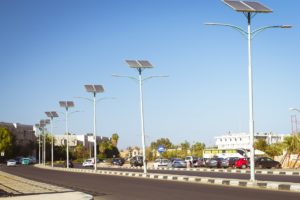
June 23, 2019//-Africa is a huge continent, consisting of endless deserts and colossal rivers. It has more than 150 active volcanoes and 26,000 kilometers of windswept coastline.
Africa consists of 54 countries that are home to about 1.2 billion inhabitants – over 200 million of whom live in extreme poverty.
Africa has long struggled with providing a reliable and wide-reaching electricity network. However, renewable energy is starting to change this, with both small and utility-scale projects taking place across the continent.
These projects hold the potential to use Africa’s natural gifts and bring clean, cheap, and reliable power to those who have never had access before.
Over-reliance On Fossil Fuels
Africa’s energy consumption is still heavily dependent on fossil fuels – oil (43.7% of the total), gas (27.1%), and coal (20.7%). Although the continent has huge energy potential, the utilization of renewable power sources hasn’t even come close to reaching its peak. Hydro accounts for only 6.5% of the total generated energy, while nuclear and renewables combine for 2%.
Electricity Challenges
Concerns about over-reliance on fossil fuels and carbon emissions from coal-powered stations, coupled with the fact that Africa’s energy consumption increased by 2.9% in 2017, make the switch to renewable energy sources the continent’s top priority. While the lack of energy is not the only challenge that Africa faces, it’s a major roadblock towards its socio-economic development.
Roughly 1 billion people don’t have access to electricity. In Africa, almost one in three people live without electricity, often having to resort to spending hours in darkness or using kerosene. A vast majority of those without electricity live in rural areas. Even those who have access to electricity often find it too expensive or unreliable.
Access to electricity is vital for powering water supplies, strengthening healthcare, improving educational delivery services and telecommunication services. Moreover, access to electricity empowers economic development in rural areas and creates more jobs and industries.
Despite progress in all world regions, the world is not on track to achieve a complete shift to renewables, with Sub-Saharan Africa at great risk of being left behind. Universal access to affordable, reliable and sustainable energy is essential to reach the sustainable development goal, and help mitigate climate change.
Improving access to power generally across the continent is the main goal of both the African Union’s Agenda 2063 and the national development plans of nearly all African nations. Naturally, renewable energy technology is a key ingredient in achieving all these objectives.
Although the energy generation sources are vast in Africa, they are not evenly distributed. There are significant possibilities for wind, solar CSP and solar PV technology.
Challenges for Hydro-electricity in Africa
Hydro-electricity provides the potential to solve one-third of the Africans energy problems. However, in a continent where many countries are plagued by severe and frequent droughts, to use of rivers for power generation could prove a challenging task. Also, there are many environmental and socio-economic concerns about flooding large catchment areas.
The construction and maintaining costs of distributed hydropower networks are substantial and they can cost more than a billion dollars to build. There are also security risks involved with these projects, especially in politically unstable parts of the continent where social unrest exists.
Local renewable power generation projects that include solar, geothermal, and wind energy sources present alternatives that may become more prominent in African power generation in the future.
Climate Change in Africa
Climate change is an inevitable and urgent global challenge with long-term implications for the sustainable development of all countries. Concerns have risen as the effects of global warming have become more evident on the northern hemisphere, with parts of North America and Europe experiencing a rise in temperatures and some of the warmest summers on record. Other traditionally cold regions like Siberia are also experiencing unrecorded heatwaves. In many parts of the world, including Africa, movements promoting environmental consciousness and environmental sustainability are gaining momentum.
With many parts of the continent being already arid, the implications of global warming for Africa can be dreadful. Glaciers on Mount Kilimanjaro have already begun disappearing, and it’s only the initial manifestation of global warming in Africa.
Africa, as a continent, needs to play its role in mitigating climate change. The first step to achieving this goal is switching from coal-fired generation to renewable energy generation.
African Eye Report


